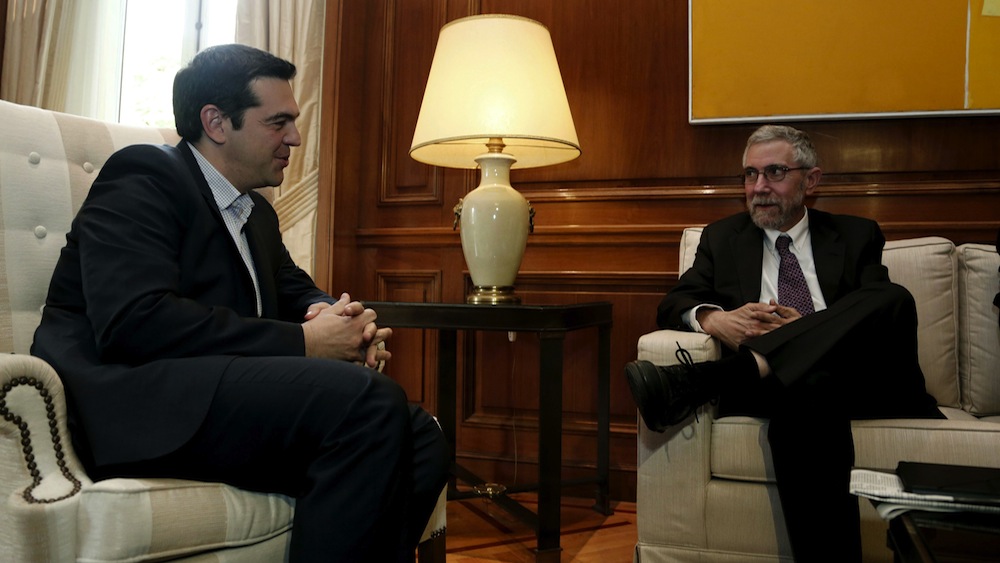There’s no question about it – Europe and the euro have been in better shape. But the advice coming across the Atlantic illustrates one thing clearly: Washington does not understand the purpose of the European Union and its common currency.
Paul Krugman recently did something amazing. The American economist, Nobel laureate, and columnist said he had been mistaken. He said he had perhaps overestimated the competence of the Greek government. He said he was shocked that Syriza campaigned for a No in the referendum on the old aid package offered by the country’s creditors without a plan B for the eventuality that further financial aid might not be forthcoming. And in the third aid package, Greece now has to face conditions that are clearly worse. That, he claims, was a shock.
This was not Krugman’s only error. He has criticized European crisis management – particularly that of Germany – in his New York Times column for years. Now he provides a very American assessment of the crisis: radical austerity policies cannot heal economies in recession. In his view, this will most likely send over-stretched states into an even deeper crisis.
This criticism ignores the fact that for some time now there has been no pure austerity. Even Greece has been offered an extensive investment program. And the examples of Portugal and Ireland show that policies of cuts and savings can bear fruit – and that Greece is a special case.
But the American reading of the crisis exposes something more basic: few people in the US administration, in the Capitol, and on Wall Street understand the European project. German Finance Minister Wolfgang Schäuble, who is now portrayed in the Anglo-Saxon press as a bad, anti-European German, made the point in his own manner – he said Krugman was an important economist and trade theorist, but one who had “no idea” of the history and principles of the European currency union.
Krugman is, of course, not America – but Barack Obama has repeatedly voiced his own concerns about German handling of the European debt crisis to Angela Merkel. An American diplomat recently adapted Donald Rumsfeld’s phrase when he said that what worries Washington were the unknown unknowns. The US, for its part, struggled during the 2008 Lehman crisis because its own analysis had factored in only the known unknowns.
This poses a question: do Europeans think they know how the financial markets would react to a Grexit because the eurozone has secure firewalls? Are all the variables really visible – “known” unknowns? The question is of course legitimate and justified. Stability on the financial markets is undoubtedly good for Europe and the US.
But there are other factors to consider, questions of currency, constitutional concerns, and geopolitical matters. At the end of the day, a trade-off was needed – and Brussels decided to keep Greece in the euro. A third support program is on its way.
The German government is itself not exactly a bulwark of unity – Schäuble still considers a temporary Grexit the better option, while Vice Chancellor Sigmar Gabriel disagrees. And Angela Merkel? She is certainly not shooting for a Grexit, but she needs the option in her negotiations and deploys her finance minister to this end. She does this not to blackmail Greece, nor to rob Athens of its sovereignty, and certainly not to secure German dominance in Europe. Rather she uses it to fend off blackmail from the Tsipras government, which was aimed at dismantling European rules of engagement. These are two kinds of rules – economic rules without which, as we now know, a common currency cannot function, and constitutional rules and conventions without which the European project would be at an end.
Both were put at risk when Alexis Tsipras’ government used a national referendum to try to upset the democratic decision making process in the eurozone and EU. How could a compromise be made in Brussels in the future if every member state were to take absolute positions, backed by national votes? “Going public” would then mean “going down”. That, not the lack of a plan B, Professor Krugman, was the shock delivered by the Greek referendum and the government’s plea for a No vote.
If the EU intends to have influence in tomorrow’s world on an equal footing with the US and China it needs to be taken seriously, both in terms of its economic power and its ability to solve political problems. Brussels is united in this view, as is Berlin. Merkel, Schäuble, and Gabriel saw Tsipras’ actions as an ideologically driven attack on Europe’s consensus machinery.
And as far as the bad German is concerned – it may be difficult to explain to the Anglophone public, but Schäuble is the most convinced European within the German government. He is still hoping that the debt crisis will eventually offer the chance for more European governance. Today that requires a person to have a great deal of optimism, and be a committed European indeed.







